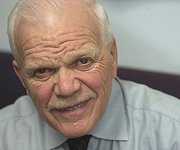Edward Laumann, the George Herbert Mead Distinguished Service Professor in Sociology
By William Harmsw-harms@uchicago.edu
News Office
 Edward Laumann |
|
Edward Laumann says he always does what’s best for his students, even if it means sharing unpleasant observations, such as he did when a student was rehearsing a presentation in the hopes of securing a teaching job.
Although the student eventually received an important faculty appointment, Laumann considered the rehearsal too casual for the intended audience. Laumann, the George Herbert Mead Distinguished Service Professor in Sociology, told the student that the faculty audience would be disappointed, and advised the student to prepare and memorize a talk before the real presentation.
“They have to realize who is coming to the talk. It’s not necessarily people who are specialized in the field they have researched,” said Laumann. He tells students to make their job pitches touch on points that are important to people from a variety of perspectives and to present the talk in an organized, thoughtful way.
That well-placed reminder about what a candidate should expect at the job talk is the final stage in a three-step progression through graduate education in Sociology. Laumann noted that each step requires a different level of guidance from a professor.
He said he begins his contact with students by teaching an introductory graduate course, Sociology Inquiry.
“Many students come in not really understanding completely what the discipline of sociology is about,” Laumann said. The students have a tendency to become too self-critical as they begin learning more about the field, and sometimes they become overwhelmed and begin to lose their confidence, he pointed out. That self-doubt can stand as an obstacle when they prepare their first major paper, the master’s thesis.
“When I work with them on their master’s papers, I help them overcome this, but explaining exactly what is expected so that they don’t let their self-criticism become paralyzing,” he said.
As students gain confidence and begin to grasp the tools of sociology, Laumann moves them to the second stage of the progression: finding a meaningful problem to study.
“They might come to me with a question they want to pursue, and I’ll ask them if it’s an important question, or if they want to look into it simply because they have the data,” he said.
Laumann develops solid relationships with students and comes to understand their strengths and interests. That gives him ideas for how he can best help them succeed as sociologists. He considers himself somewhat of a “jazz pianist,” who learns to appreciate the talents of his students and brings out what’s best in each.
“As they work on specializing their interests, I try to connect them with others in the department who are doing related work,” he said.
Laumann’s former students have developed into professional colleagues, and he stays in touch with them in their professional careers. He finds satisfaction in their ability to continue an approach to sociological inquiry that he has championed—network analysis.
Network analysis is a way of understanding how people relate to each other and form networks and partnerships for their mutual benefit. Laumann has used the approach for a variety of studies, including work on the way influence groups operate in Washington, D.C., to the way society is organized around sexual relationships.
“It is very gratifying to see the work I have done in network analysis being carried on across the country,” he said.
![[Chronicle]](/images/sidebar_header_oct06.gif)